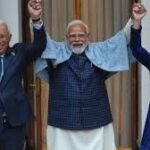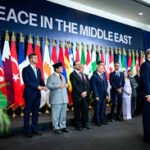BRICS is a Rising Bloc in Global Politics.
The BRICS group, comprising Brazil, Russia, India, China, and South Africa, represents a significant shift in global geopolitical dynamics. Formed initially as BRIC in 2009 and expanded to BRICS with the inclusion of South Africa in 2010, the coalition aims to provide an alternative platform to the established G-7, which includes the world’s seven largest advanced economies. As global challenges evolve, BRICS has increasingly emerged as a formidable bloc, not merely a counterweight but a complementary force that brings its own unique perspectives and solutions to the table.
BRICS was conceived from the recognition of the growing economic influence of its member countries. The acronym initially represented the major emerging economies that were expected to play a pivotal role in the global economy’s future. These nations, despite their varied political systems and cultures, share common objectives in rebalancing global economic power and reforming international institutions. Their primary goal is to foster a more equitable global order, challenging the dominance of Western-centric institutions and narratives.
One of the core strengths of BRICS lies in its economic collaboration. The member states are among the largest emerging markets globally, and their collective economic weight provides a substantial counterbalance to the G-7 economies. The BRICS countries have worked to enhance trade and investment among themselves, creating mechanisms such as the New Development Bank (NDB) and the Contingent Reserve Arrangement (CRA). The NDB aims to support infrastructure and sustainable development projects in BRICS and other emerging economies, while the CRA serves as a financial safety net for member countries facing balance of payments crises. These institutions represent a deliberate move towards greater economic independence from Western-dominated financial systems.
Politically, BRICS seeks to assert a multipolar world order. Its members advocate for the reform of global governance institutions like the United Nations Security Council and the International Monetary Fund, which they argue are outdated and biased towards Western interests. By positioning themselves as a bloc that champions the interests of developing and emerging economies, BRICS aims to challenge the G-7’s hegemony in global policy-making.
Strategically, the coalition also serves as a platform for dialogue on various international issues, including security, climate change, and global health. While the group’s diverse political and economic systems sometimes lead to differing viewpoints, its members share a common interest in promoting a more balanced global approach. The strategic discussions within BRICS often focus on issues like the geopolitical implications of climate change, cybersecurity, and the impacts of global economic fluctuations, reflecting a broader and more inclusive perspective on global challenges.
The BRICS group, despite its shared goals, is not monolithic in its approach to global challenges. The individual interests of its member states sometimes lead to differing perspectives on major global issues. For example, while China and India may have converging interests in promoting economic development, their regional rivalries occasionally create tensions within the bloc. Similarly, Brazil and South Africa might prioritize environmental issues more heavily than other members, reflecting their specific domestic challenges and priorities.
The diversity within BRICS can be both a strength and a challenge. On one hand, it allows for a broad range of perspectives and solutions, enriching the group’s discussions and approaches to global problems. On the other hand, it can lead to disagreements and slow decision-making processes. However, the very existence of this coalition demonstrates a commitment to addressing global challenges through collective action, even when consensus is difficult to achieve.
While BRICS operates as an alternative to the G-7, it is not merely a reactionary entity but a proactive force with its own agenda. The G-7, representing the world’s leading industrialized nations, traditionally focuses on issues from a Western-centric perspective. In contrast, BRICS offers a platform for emerging economies to present their viewpoints and solutions, often emphasizing development, equity, and inclusive growth.
The G-7’s influence on global economic policies has been significant, but it often reflects the interests of its member countries, which are predominantly advanced economies. BRICS, in its own right, challenges this narrative by advocating for a more diversified approach to global issues. The group’s initiatives, such as the NDB and CRA, provide alternative frameworks that reflect the needs and priorities of emerging economies, which can sometimes be overlooked in G-7 discussions.
The rise of BRICS has notable implications for global governance. The coalition’s push for reforming institutions like the IMF and the UN Security Council highlights its desire for a more representative and equitable global governance structure. By advocating for greater representation of emerging economies in these institutions, BRICS challenges the traditional power dynamics and seeks to democratize global decision-making processes.
Moreover, BRICS’ emphasis on sustainable development and climate action reflects a broader shift towards integrating environmental considerations into global policy. This focus is particularly relevant given the growing global consensus on the need to address climate change and its associated challenges. The BRICS countries, each facing unique environmental issues, contribute to a more comprehensive and diverse dialogue on sustainability.
As the global landscape continues to evolve, the role of BRICS is likely to become increasingly significant. The bloc’s ability to navigate internal differences and present a unified front on global issues will be crucial in determining its impact. Additionally, the ongoing economic and geopolitical shifts, including the rise of new powers and the reconfiguration of global alliances, will influence BRICS’ strategies and effectiveness.
The potential expansion of BRICS, with other emerging economies expressing interest in joining, could further enhance its global influence. However, the integration of new members would also require careful management of diverse interests and priorities. The future of BRICS will depend on its capacity to balance internal cohesion with its external objectives and to continue providing a meaningful alternative to existing global power structures.
In summary, BRICS represents a significant and evolving force in global politics. As a coalition of emerging powers, it offers an alternative perspective to the G-7 and seeks to address global challenges through a more inclusive and equitable approach. While its diverse membership presents both opportunities and challenges, BRICS’ initiatives and advocacy for reforming global institutions reflect its commitment to shaping a multipolar world order. As the bloc continues to develop and adapt to changing global dynamics, its role in international affairs is likely to become increasingly prominent, offering new perspectives and solutions to global issues.




Leave a Reply